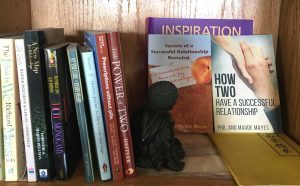Maude Mayes's Blog: Secrets of a Successful Relationship Revealed, page 92
January 18, 2017
Successful Relationships Reading Corner
In this week’s blog we wrote about sacred space, the time spent focused on each other. This week’s links are about that.
The Policy of Undivided Attention “Before you were married, spending time alone with each other was your highest priority. You probably spent the majority of your leisure time together, and the time you spent together was probably the most enjoyable part of every week. But after marriage, like so many other couples, you may find that you can be in the same room together and yet ignore each other emotionally. What’s even worse, you may find that you are not even in the same room together very often, particularly after your children arrived.”
How to Become the Sacred Couple “In this crazy modern world, being in a relationship with a partner sometimes comes second or third in priority to work, or whatever else is occupying your attention. However, it is possible to maintain a sacred relationship in this modern world of multitasking, but it requires an intentional choice on the part of each person in the relationship.”
When Love Is Not Enough: 4 Tips for a Strong Relationship “My husband and I were going through a difficult time a few years ago. It felt like a pivotal time in our relationship. We were not spending any quality time together, nor were we going out together as a couple…. It’s important to set some time aside to just be a couple; spend quality time together regularly, but especially during hard times. This doesn’t need to involve money; just a walk down the park together or along the beach will help. Just taking yourself out of your home environment will be beneficial.”
January 15, 2017
Why Sacred Space in a Relationship is Important
 One practice that is a major part of how we are together is what we call sacred space – the time when we are together for the purpose of being together. Although every couple has a different way of approaching this, all joyous and nourishing ones have this as an integral and regular part.
One practice that is a major part of how we are together is what we call sacred space – the time when we are together for the purpose of being together. Although every couple has a different way of approaching this, all joyous and nourishing ones have this as an integral and regular part.
What do we mean by the term sacred space? It is not a physical location, although some partners do actually create a space they use for coming together in this way. Sacred space is instead a special way of being with each other. It is a time when you step away from the busyness of your daily life. This is an intimate sharing during which you are reveling in the pleasure of each other’s company, celebrating your partner and, most of all, your togetherness.
What you do is not as important as doing it regularly. It needs to be given the time that something of top priority deserves, not pushed aside until everything else is taken care of. Put it into your calendar. Turn down other things if they interfere. You must ensure that you take time for this until it becomes so precious to you that you hunger for it. Develop this practice and you will never let it go!
Sacred Space is the underpinning of all your togetherness #relationships #quote
Click To Tweet
No matter how people choose to celebrate this time, there are certain characteristics of the experience that are the same for all. In this space you are completely present. You are not dwelling in the past or planning what is to come (unless it is part of the fun you are having together.) You both have each other’s full attention and can feel that you are both being seen and heard for who you are. This is a time filled with warmth, pleasure and a deep intimacy. This intimacy becomes an underpinning of all your togetherness and it assures you that you are both unqualifiedly on the same side.
We have found this to be so rejuvenating that we take this time every evening. With rare exceptions, we remove ourselves from phones, friends and family, and retire to be together. We have a variety of activities that we do during this time, but what they are is not important. Regardless of the specifics, we are basically delighting in being together, deepening our knowing of each other, laughing and playing, loving and being loved.
We think this is an important yet under-examined area, and want to explore this topic further with your help. We would like to hear how you create your special time together and what it means to you. Write us or add a comment below; we can arrange many different ways to make it easier for you to talk with us about what your sacred space looks like and how you celebrate it!
We look forward to seeing peace spread through conflict free happy relationships. This is a wonderful way to change the world. Join us in spreading peace one relationship at a time.
January 11, 2017
Successful Relationships Reading Corner
 In this week’s blog we wrote about whether differences are a strength or a weakness in a relationship, and concluded that, except for major differences, they are a positive. This week’s links write about that, including one that is about the benefits of diversity in groups.
In this week’s blog we wrote about whether differences are a strength or a weakness in a relationship, and concluded that, except for major differences, they are a positive. This week’s links write about that, including one that is about the benefits of diversity in groups.
The Myth of Irreconcilable Differences “In a court of law, if both partners of a married couple claim they have irreconcilable differences, the court will grant them a legal divorce – without even asking what the differences are! Joyce and I, on the other hand, having worked with thousands of couples over the last 37 years, challenge that there is no such thing as irreconcilable differences. We have seen that ANY difference can be not only tolerated, but even appreciated. But that takes real understanding and a commitment to love.”
How the Differences in Your Relationship Can Be Gifts “It’s in our nature as humans to gravitate towards those who have interests similar to our own. And in many ways, this serves us well. On the other hand, it doesn’t leave much room for experiencing all that life has to offer. By opening ourselves up to another way of living and being, we can make more educated decisions about what we want our own lives to look like. These varied life experiences allow us to express ourselves more fully and be more authentically present in the world.”
How Diversity Makes Us Smarter is about differences in organizations, not between two people, but it offers an interesting different perspective on the same issue. “Decades of research by organizational scientists, psychologists, sociologists, economists and demographers show that socially diverse groups (that is, those with a diversity of race, ethnicity, gender and sexual orientation) are more innovative than homogeneous groups. It seems obvious that a group of people with diverse individual expertise would be better than a homogeneous group at solving complex, nonroutine problems. It is less obvious that social diversity should work in the same way—yet the science shows that it does. This is not only because people with different backgrounds bring new information. Simply interacting with individuals who are different forces group members to prepare better, to anticipate alternative viewpoints and to expect that reaching consensus will take effort.”
January 8, 2017
Differences – Strength or Weakness in a Relationship?
 Differences are often seen as creating problems and conflict. Three main areas are:
Differences are often seen as creating problems and conflict. Three main areas are:
how things are done
styles of socializing
passions
How Things are Done
From the toilet seat and toothpaste to finances and child-rearing, what our partner does affects us. Some of these are vitally important to both people, so you both have to find mutual solutions for these decisions. That’s what core values are about – we wrote about these recently here and here.
But many differences simply reflect what we are used to. We recently read about a couple redoing their kitchen who clashed over whether pans lived to the left or right of the sink. Turned out that their choice reflected the organization in their respective childhood kitchens.
Then there are behaviors of your partner that don’t affect you at all, like how a purse is organized, or which route to take when driving. These are differences which have no direct bearing on you, and the sooner you are able to recognize your partner as a separate individual with different ways of doing things, the more peaceful and happy your relationship will be. Putting effort into making every aspect of the world match your expectations is a tremendous waste of energy that could go towards creative endeavors. Flexibility here is just as valuable as flexibility in your body; both help you move through the world more easily.
Differences are seen as a problem area; accepting them has an enormous & freeing effect #quote #love
Click To Tweet
When you have the kind of supportive intimate relationship where your mate feels safe enough to show themselves to you in a free and undefended way, you have an extraordinary opportunity to grow and broaden your world. Here is a person who has the same core values as you do, who you love and trust, and who is carrying out the art of living in a different and unique way. You get the privilege of seeing the inside details of who they are and how they do it. This can be a cause for celebration, an opportunity to recognize the beauty in diversity, a wonderful way to get insights into yourself.
Styles of Socializing
This covers all the ways that you interact with other people. Perhaps you’re an extrovert and your partner is introverted, or vice versa. Don’t try to align the two. Relish the variety that comes from how different you both are. One person can go to Toastmasters while the other stays at home with a book.
You can let the different style of your partner stretch and expand you. James, one of the people we interviewed for our book, “How Two: Have a Successful Relationship,” shared his experiences of this:
We’re actually really different. I’m not a gregarious person. I’m quiet. So I don’t really pursue friendships or going out to parties. And Rita is one hundred percent gregarious. But we get along because if I don’t want to go to a party, I don’t have to, but it makes her really happy if I do go, so I try to go. As far as parties and friendships and being around people, we’re just totally different that way. I’m very predictable; if there’s a big crowd over there, then I’m over here, and Rita will be in the middle of the crowd…. To me, it’s sometimes a way to improve myself – like if she wants to go to a party, I’ll grumble to myself about going, but then I think “Well, wait a minute. You’re not really very good with people; it would probably be good if you went to a party and put yourself in that environment.”
Passions
Once both of you know that differences are not a problem, you will be able to follow your interests, whether it be golf, crochet or model trains, secure in the knowledge that you have total support for who you are and what you want to do. Your different interests will not be taken as a threat. Neither of you will act on a need to try to make the other the same. This sounds like such an easy thing, and yet it eludes many couples. If you follow this path you will experience an unimagined enrichment in yourself and your relationship!

The simple act of accepting your differences will have an enormous and freeing effect on both of you. Celebrate, admire and marvel at the person your partner is, and use their acceptance of your differences to grow and live, unconstrained by imaginary limitations. This way of being together can slowly change the world, spreading peace one relationship at a time. Please join us in the direct experience of learning what peace is by practicing conflict free relating. It starts with acceptance of the uniqueness of each individual. What better place to do this than in your most intimate relationship?
January 4, 2017
Successful Relationships Reading Corner
In this week’s blog we wrote about growth and change in the new year. These articles offer resolutions for the new year and observations on personal growth.
New Year’s Resolution for Your Relationship: More Kissing “What’s a fast way to stay more connected with your partner in the new year? How about more kissing? Daily kissing. Not just a peck, but real contact. What does a kiss do? Well, it may just do more than you think and everything you need.”
New Year’s resolutions for your relationship “Lots of people make a New Year’s resolution, but how many have resolved to improve their relationship this January? While you might take the annual vow to lose weight, save money or stop biting your finger nails, it’s easy to forget the resolutions that could improve things not just for you, but your partner and children too.”
How To Use Your Relationship For Spiritual Growth “Intimate relationships present us with one of our best opportunities for growth. They often trigger our deepest, oldest wounds. They’re supposed to do this. Why? So we can heal. Ideally, the relationship becomes a safe container and a crucible for transformation for each of you individually, and for the relationship as a whole. In order to use it as such, you need one major thing: Radical honesty. Bring all your issues with you to your relationship. Share them.”
January 1, 2017
Growth and Change in the New Year
 Here we are at the end of a very intense and historic year and at the start of a brand new one. Many of us will spend time reflecting on what type of growth and changes we want to implement in the year to come.
Here we are at the end of a very intense and historic year and at the start of a brand new one. Many of us will spend time reflecting on what type of growth and changes we want to implement in the year to come.
How Does Growth Happen?
Are you the same person you were 5 or 10 or 20 years ago? No, because you have learned from your life experiences. A plant grows continuously, a little each day, but for us, growth is more of a staccato process; we gain sudden insights into our own behavior. They may be big or small, but once seen, they are not forgotten, even though it may take a number of realizations before new behavior takes hold.
These changes accumulate until they are so numerous that our whole relationship with the world has to change, too, and this can be a confusing and uncertain time. It is like a crustacean who grows until his shell, his defense against the world, is too constricting and must be discarded, leaving him free but vulnerable until another shell forms.
When we make a break through such as changing how we relate to our partner, family, money or strangers, there is a similar period of adjustment while we come to see the world in this new way.
Growth needs bravery. It is venturing into the unknown, exposing yourself in ways that you have formerly protected, taking risks that you used to avoid.
Real growth and change require openness and a willingness to enter an area of vulnerability. Openness is required because we need to allow change to occur and to stand ready to make space and embrace it. Vulnerability occurs when we peel away layers and replace them with newness and growth.
This year let’s support each other & be open to the changes that create growth #quote #relationships
Click To Tweet
In order to be in a successful relationship and go through this kind of change, it takes two strong individuals who have a real sense of themselves. But two strong individuals are liable to clash repeatedly. This can be avoided by practicing full acceptance. (We’ve written about this here and here.) In a peaceful relationship, you have to feel free to be vulnerable and effect change without needing to defend yourself. You need to feel supported as the unique person you are and supported in the changes and growth you go through without your partner feeling threatened and without you feeling any need for defense.
This is a wonderful way to move into the New Year with your partner, with both of you supporting change and neither of you feeling challenged by it.
A Tale of Two Individuals
At lunch the other day, a woman friend of ours was describing how she came to understand this and embrace it with her husband. When they were first dating, he told her that he was never going to put a woman ahead of himself in a relationship; he was first going to take care of himself and then be able to do that with his partner. She wondered about this and asked herself if this was a red flag, and whether she should perhaps get out of this before it developed any further. Well, she decided not to withdraw, and realized after some time that this was a wonderful and freeing way of being together. They would each take care of themselves and their own development and they would support each other in doing that – two strong individuals working together in partnership. Many years later, she is still marveling at how important this understanding has been to them and how peaceful and cooperative their relationship is as a result.
At this beginning of a New Year, let us remember to support each other and be willing to open up to the changes that create growth.
December 28, 2016
Successful Relationships Reading Corner
In this week’s blog we wrote about the only way that works: the Golden Rule. These articles have some wonderful discussions on this topic.
The Golden Rule is a post from the author of “Ethics and the Golden Rule” “Let’s consider an example of how the rule is used. President Kennedy in 1963 appealed to the golden rule in an anti-segregation speech at the time of the first black enrollment at the University of Alabama. He asked whites to consider what it would be like to be treated as second-class citizens because of skin color. Whites were to imagine themselves being black — and being told that they couldn’t vote, or go to the best public schools, or eat at most public restaurants, or sit in the front of the bus. Would whites be content to be treated that way? He was sure that they wouldn’t — and yet this is how they treated others. He said the ‘heart of the question is … whether we are going to treat our fellow Americans as we want to be treated.'”
He also has a great chronology.
Living the Golden Rule/Applied Ethics “Applied ethics studies moral issues (like lying and stealing), or moral questions in specific areas (like business or medicine). People who study applied ethics, while searching for ideas to help live better lives, are often relativistic—arguing that values vary depending on the point of view of the observer. The golden rule answers both concerns. The golden rule is a useful tool for moral living that also counters the relativism (since it’s a globally accepted norm that can be defended rationally).”
Philosophical reflections on the golden rule “The Golden Rule serves the needs of educated and uneducated people alike, and stimulates philosophers to codify its meanings in new formulations. Given the equal, basic worth of each individual, the rule implies a requirement of consistency; as Samuel Clarke put it, “Whatever I judge reasonable or unreasonable for another to do for me; that, by the same judgment, I declare reasonable or unreasonable, that I in the like case should do for him.” In addition, the Rule carries implications for social, economic, and political matters. In one form or another, with interpretations that differ and overlap, the Rule is a precious word in the shared language of our world”
December 25, 2016
The Only Way That Works: The Golden Rule
 In these strange times where some people seem to be trying to emphasize our differences, let us remember that religions and people from all around the globe have known and practiced a great truth, the Golden Rule, in one form or another for thousands of years!
In these strange times where some people seem to be trying to emphasize our differences, let us remember that religions and people from all around the globe have known and practiced a great truth, the Golden Rule, in one form or another for thousands of years!
This great truth, and the fact that we are all connected and part of one human family, will always win out over fear and prejudice and attempts to separate us. Remember in the darkness this shining light of truth. Growth and change are slow but steady, and this great truth will prevail. Love one another is the whole of the law!
We want to share with you today some versions of the golden rule as taught by the world’s major religions:
As you’ve now seen, the Golden Rule, “Do as you would be done by” is found in all major religions, but it’s not merely religious – it follows when we admit that someone else is just like us – human, with needs, desires and goals that are just as real and valid as ours.
Being all connected & part of one human family always wins out over fear and prejudice #quote #peace
Click To Tweet
Part of being human is that we have forebrains that can moderate our instincts and animal impulses. To let those impulses run wild is to abrogate our very humanity, and we owe it to ourselves to take the high road, not because it attracts social approval but because it receives our approval – we feel good about ourselves when we do good for others. So follow that rule!
December 21, 2016
Successful Relationships Reading Corner
In this week’s blog we wrote about making lists and keeping score. These articles have some amusing anecdotes about this.
Do You Keep Score in Your Relationships? “You and your partner just argued for the umpteenth time about whose turn it is to walk the dog:
“I walked her twice yesterday,” you point out.
“And I walked her for three days last week,” your partner retorts.
“Well,” you counter, “I took the kids to the doctor on Tuesday.”
And so it goes. You and your partner seem to be endlessly keeping a tally on who did what for whom, when, and at what cost of time and effort.”
Kindness and Keeping Score “A few years ago, seated around a luncheon table at a business meeting, I tuned into a conversation among my table-mates. A woman whom I knew only barely was describing with unconcealed pride the electronic filing system she had created some years before to track Christmas cards. She described an elaborate program which maintained both a database of names and addresses, and a spreadsheet.”
Why ‘Keeping Score’ Ruins Relationships (And How To Stop NOW) “‘Some view relationships as a bank account. It is an interesting analogy, but it is inherently flawed as it is hard to quantify deposits and withdrawals,’ says…Laurel House. How do you value and therefore quantify the difference between deposits that are financial, emotional, or time and effort-oriented? ‘If this in in fact the measure that both partners in the relationship agree on, yet the weight of each type of deposit or withdrawal is not defined, it’s easy to feel like there is an imbalance as one person in inevitably always going to feel as though they are the one making the greater contribution,’ says House. Obviously, this causes resentment.”
December 18, 2016
He’s Making a List and Checking it Twice
 Everybody wants to have a sense of fairness in their relationship, and many people do this by what we call making lists and keeping score.
Everybody wants to have a sense of fairness in their relationship, and many people do this by what we call making lists and keeping score.
Maybe you take turns to make dinner, but sometimes your partner is busy and you have to double up, or they offer pizza in exchange for your elaborate feast.
Maybe you each have different tasks, but do not value each other’s contributions correctly. What is seen as the simple act of driving to school, picking Jane up and coming back is actually getting the car out of a tight parking spot, needing to get gas, running into road construction, finding Jane’s friend vomited on her backpack, and having mother call twice for help because her email isn’t working.
Measuring and comparing leads people to ignore the very differences that bring richness to the relationship in favor of some unified scale that seeks to put each partner on the same level in each activity. This brings a false picture of sameness and devalues the unique qualities each contributes.
When you measure fairness in your relationship this way, you are certain to find inequalities. You feel that your contributions are not valued enough, that your partner is failing in execution or being unnecessarily meticulous, and when this is brought up, a whole list of grievances bursts forth, and the best you can hope for is a better awareness and a renegotiation of contributions.
What’s underneath this need for fairness? A sense that you might get used, cheated, taken advantage of. It comes from the position that the two of you are together because there are certain areas of mutual benefit – sex, saving rent, or social status – but other areas where you are in conflict – possessions or parenting or personal space.
Making lists & keeping score can wreck your relationship It emphasizes separateness not union #quote
Click To Tweet
This is where core values come in. We have just written about the necessity of holding the same values as your partner, and goals are included in this, too. When this is the case, you can act in union, that is, as one; you can act as part of a team that has common aims.
When you begin measuring and comparing your actions to those of your partner, you are stepping outside the union. You are no longer viewing the relationship from the solid foundation of union, from which two separate individuals function together for mutual support and growth. You have stepped away from that and are looking at yourself and your mate as two individuals whose acts or lack thereof are not connected in union, but rather in a generally adversarial way, as though each is in it for themselves.
In successful relationships, the partners work from the deep understanding that they are on the same side and that they want the very best for each other and they know their partner feels the same way. Without the union being the platform from which all else is viewed, there are just two separate individuals making their way through life.
Secrets of a Successful Relationship Revealed
We use this blog to continue the exploration of the magic that can be found in a relationship, and the wider implications of peace for the world. ...more
- Maude Mayes's profile
- 8 followers



